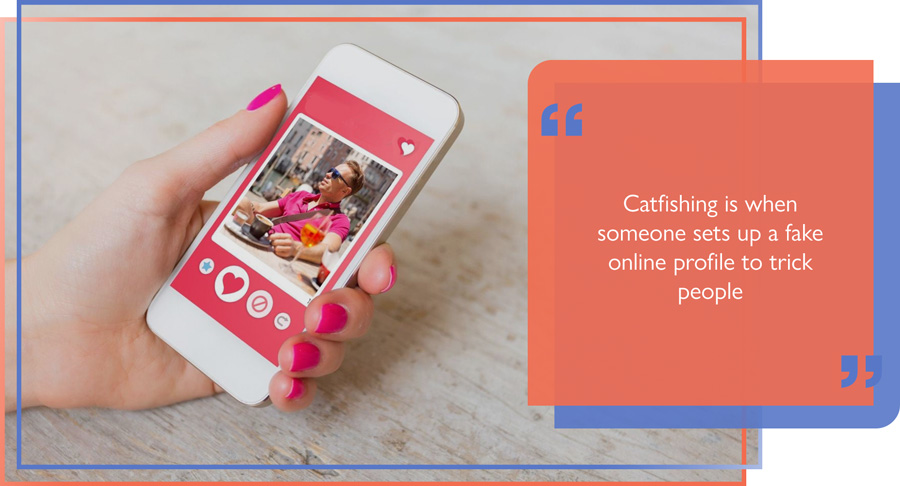
Catfishing in the UK
‘Catfishing’ occurs when someone sets up a fake personal profile on the web to trick people. It’s usually an attempt to fool someone into a relationship. Sometimes it also involves convincing people to part with their money.
Sadly, catfishing in the UK is an increasingly common occurrence. We’ve put together this guide to help you identify catfishing, and decide on what to do next.

Common catfishing alerts
Catfishers are often hard to spot. After all, they’ve worked hard to ensure their fake profile looks realistic. That said, there are a few things that should set alarm bells ringing.
Linguistic mistakes
We all make typos and grammatical mistakes on social media sometimes. However, there’s a difference between spelling something incorrectly and writing in a way that seems slightly odd.
If ‘English Bob from London’ consistently writes in a manner which suggests English isn’t his first language, then maybe he isn’t what he seems to be.
Scroll through their profile
- What has and has not been included?
- Have they shared any posts on their profile from friends or family?
- Have they checked in anywhere lately?
- What about their friends, their interests, and their photos?
- Have they only got one recent photo of themselves in among the palm trees, even though it’s November and they haven’t mentioned anything about going away on holiday?
Keep an eye on details that don’t quite add up.
Catfishing creates false impressions
- Does this person just happen to share all your interests and passions?
- Do they seem to love everything you love?
- Are they unbelievably good looking, apparently well off and single?
- Have they promised you a holiday in St. Lucia by way of a first date?
Unfortunately, if it seems too good to be true, it nearly always is. Trust your instincts and proceed with extreme caution.

They want to talk about money
If they ask for money or a loan, you should be very careful. It may only be a small amount, they may have a good reason, and they may come across as very convincing.
In some cases, they may not ask you for money straight away, but they may start asking questions which are designed to inform them about your circumstances. This can be quite subtle. For example, at Christmas you might find yourself drawn into a conversation about how much you spend on family presents, or what type of holiday you’re planning for next year.
These questions might seem innocent, but you can give away a surprising amount of information about yourself if you’re not careful. Never, ever send any money.
Something doesn’t add up
Keep a careful note about what they’ve said, in particular some of the details. Perhaps they mentioned their son named ‘James’, but next time they call him Charlie. Maybe you could have sworn they said they had never been to America, and suddenly a picture appears on their feed of them standing in front of the Statue of Liberty. Maybe they tell you that they are the CEO of some huge, international corporation.
If some of the details seem far-fetched or inconsistent, be on your guard.
They don’t want to meet online
If the relationship is going well, you may feel ready to move things on to the next level and start meeting via video calls. If your new friend won’t agree to this, it may be because they are not who they say they are.
What should you do if you have suspicions?
The first thing to bear in mind is that there is nothing wrong or silly about being cautious. As the saying goes, it is always better to be safe than sorry. With increasing incidences of catfishing in the UK, experienced operators can be highly sophisticated and very convincing.
Don’t be too alarmed if you suspect you’ve met a catfisher, but do be careful. When called out, some can become abusive and unpleasant.

Discrete catfishing investigation
As experienced and professional investigators, our services provide an affordable and discrete way of checking whether someone you’ve met online really is who they say they are.
We can normally spot catfishing when we examine a suspect’s profile. A few quick technical checks will confirm whether you were right to be suspicious.
We will find out who they are, where they live, whether they work where they say they do, or whether their profile is completely bogus. If they turn out to be bona fide, they don’t need to know that we were ever involved.
If they do turn out to be a catfisher, we can advise you on what you should do next and whether a crime has been committed.
Get in touch with a Private Investigator
Catfishing is a horrid experience. If you’re online, you need to be alert and vigilant. If you have any suspicions, please give us a call on 020 3929 3797 or email enquiries@trojansurveillance.com. Let us help put your mind at ease.
